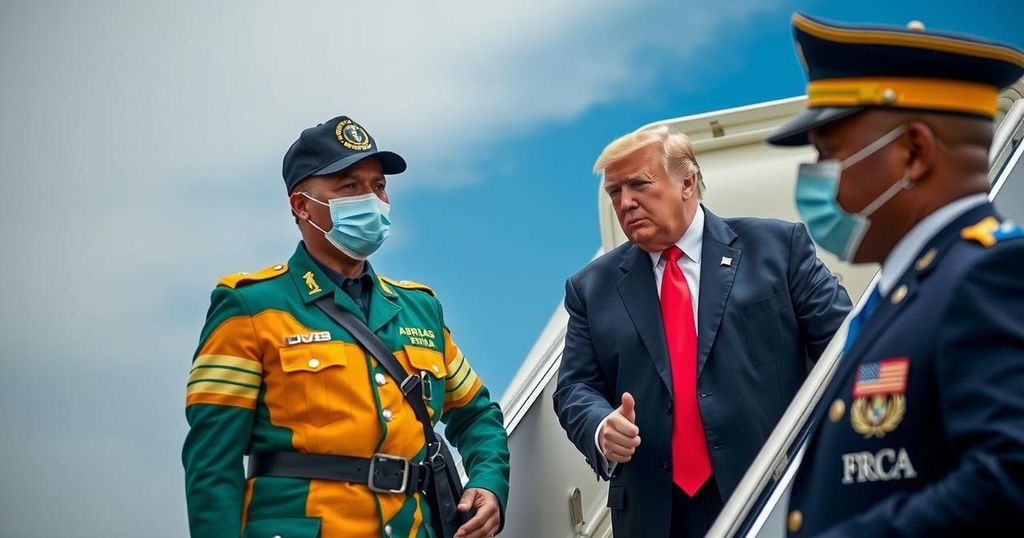African Exporters Face Uncertainty as Trump Resumes Presidency
African exporters, particularly in the citrus and textile industries, express anxiety over their future in the U.S. market as Donald Trump returns to the White House. With plans to potentially impose tariffs on imports, the African Growth and Opportunity Act (AGOA) may face uncertain renewal, jeopardizing financial stability and jobs across several African countries reliant on U.S. exports. Experts urge preparedness while navigating potential policy changes that could affect trade relations.
As Donald Trump prepares for his return to the White House, African exporters are caught in a dilemma of uncertainty regarding their future in the U.S. market. Their current access to the American market is facilitated by the African Growth and Opportunity Act (AGOA), which allows for duty-free and quota-free exports of numerous goods, including citrus fruits, textiles, and automotive parts from various African nations, particularly South Africa, Kenya, Nigeria, and Ghana. With President-elect Trump having indicated intentions to impose a 10% tariff on all imports, the potential impact on AGOA reauthorization, which is due for review next year, has raised concerns among exporters. The AGOA legislation, enacted in 2000, plays a crucial role for approximately 1,800 products from 32 African countries, and its modification or elimination could pose significant challenges for African businesses reliant on U.S. exports, leading to job losses and financial repercussions in local economies. Justin Chadwick, CEO of the Citrus Growers’ Association of Southern Africa, emphasized the critical role of AGOA for South African growers, warning, “Should South Africa be removed from AGOA, thousands of rural jobs could be impacted, as well as over a billion rand ($55.5 million) in export revenue could be lost.” Another exporter indicated that the loss of AGOA would be detrimental to their operations, which provide substantial employment and export capacity. While some analysts express doubts about the broader economic consequences in South Africa, they indicate that businesses must prepare for potential changes. Ken Manners, managing director at SP Metal Forgings Group, remains cautiously optimistic but acknowledges possible price adjustments in the automotive sector, stating, “I don’t foresee any major changes in the buying patterns of Americans around the products that we supply.” In parallel, discussions surrounding AGOA’s future suggest that negotiations may focus on tightening rules of origin for textiles and cars, posing a unique challenge for African exporters. Mukhisa Kituyi, a former UN official, noted the potential for a renegotiated AGOA rather than total withdrawal. He cautioned, “If they tighten the rules of origin… we can see a diluted AGOA-lite going forward.” The situation presents African exporters with a complex landscape characterized by hope for continuity in trade relations and fear of detrimental policy shifts. As Trump assumes office, the focus shifts to how U.S. policies might evolve regarding African nations, particularly considering geopolitics amidst shifting global alliances. As exporters navigate this uncertain territory, maintaining strong advocacy and proactive preparation will be essential in ensuring resilience against potential adverse impacts.
The African Growth and Opportunity Act (AGOA) has been instrumental since its inception in 2000, providing African countries with preferential access to the U.S. market. Currently, approximately 1,800 products from 32 nations benefit from this arrangement, promoting economic growth and job creation across the continent. However, the return of Donald Trump as President raises questions about the future of AGOA, especially with his expressed intention to impose tariffs on imports and review the preferential trade agreements that significantly impact African economies. Many export sectors, including citrus, textiles, and automotive parts, fear that the potential withdrawal or alteration of AGOA could lead to significant economic consequences and job losses.
The prospects of African exporters hang in the balance as Donald Trump returns to the White House, stirring anxiety about the future of the African Growth and Opportunity Act. Changes to U.S. trade policies, particularly those affecting tariffs and preferential trade access, could have profound implications on the economies reliant on U.S. exports. In light of uncertainties, African exporters must prepare for various outcomes while advocating for robust trade relations with the United States, highlighting the need for resilience amid shifting geopolitical landscapes.
Original Source: www.seychellesnewsagency.com








Post Comment